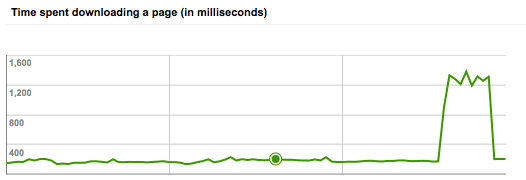Litespeed Vs. Apache web server - Real world page loading speed test results
Thankfully, Google Webmaster Tools (GWT) came to our rescue, exactly showing how Google viewed CrazyEngineers. Check the graph which I just obtained from GWT.

The hills you see in the graph were created when the site was running on Apache Web Server. After correcting the license issue, the page loading times were back to normal. We've all the reasons to believe that average page loading speeds of about ~200 - 250 milliseconds is extremely fast for a site like ours (lot of content, users and images).
LiteSpeed is a drop-alternative to Apache web server, which apparently is the most popular web server. Note that we're running a commercial version of the server as against the free software - Apache. I've heard that webmasters have noticed similar improvements with NGIX; but I've no tests or access to test machines to check it all by myself.
If anyone of you has had a chance to play with different web servers, please let me know your observations. I'm curious to know what exactly Litespeed does differently that it gains that much of an edge over apache?
